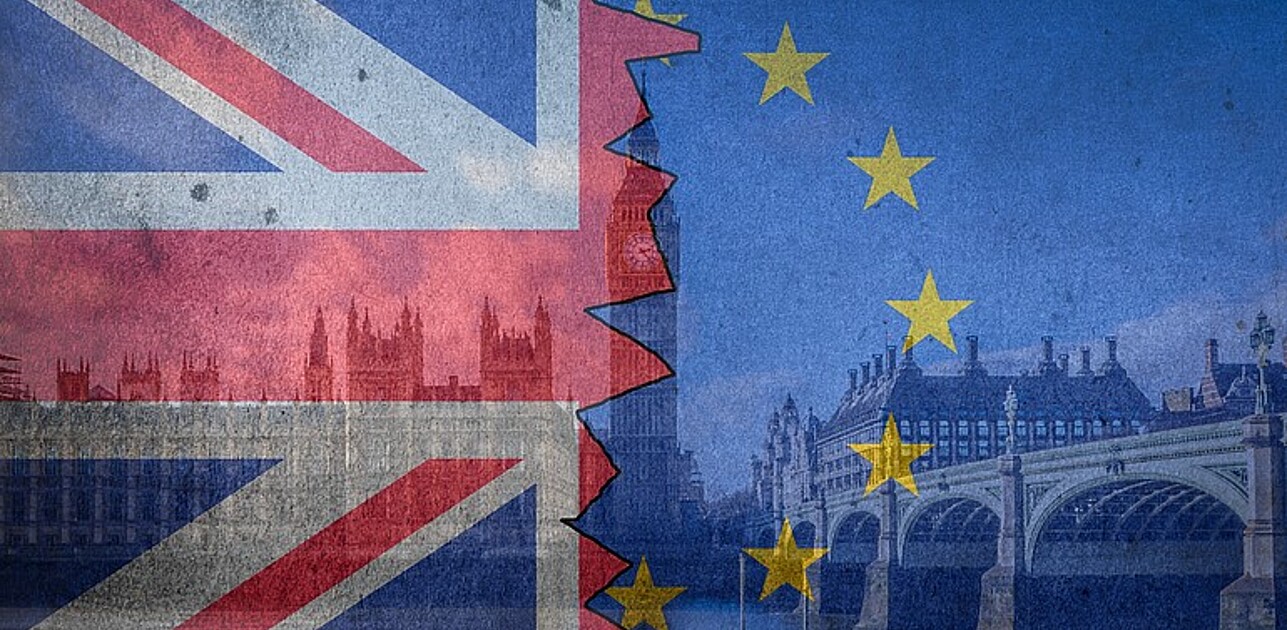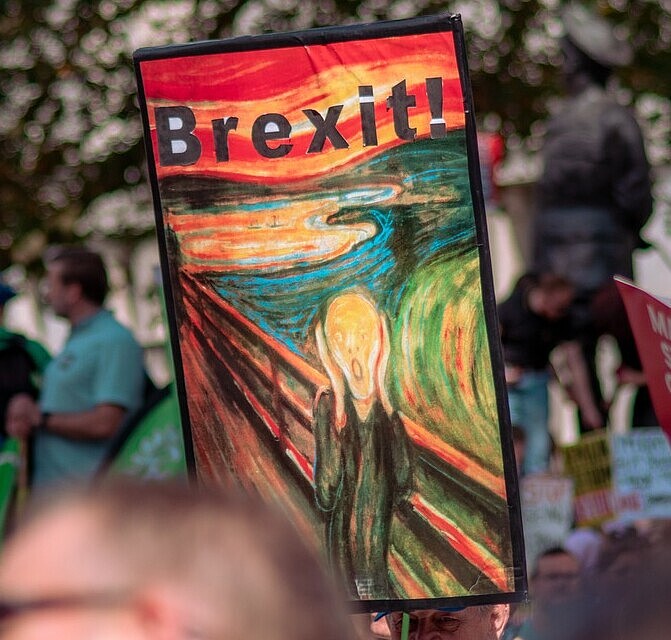

Blog: Thursday, 2 August 2018
Dr Henk de Vries is Associate Professor of Standardisation at Rotterdam School of Management, Erasmus University (RSM). He is President of the European Academy for Standardisation (EURAS). In this updated article, he sets out his thoughts on a simple Brexit that suits business.
The Brexit negotiations come closer and closer to the resolution but what will this resolution be? Any variant seems to be a disaster for companies both in the UK and in the EU because the British are likely to disappear from the Single Market without proper alternatives being prepared in good time. This is because of the lack of coherence on the British side, but also because of rigidity on the EU side. Leaving the issue to politicians and legal experts could lead to an outcome that is detrimental to business and society on both sides of the Channel. I will attempt to show there is a simple way out, by taking a business perspective.
The roots of the European Union go back to the years after the Second World War. The main idea was to ensure peace between the states of Europe by making these states dependent on each other for trade. In order to achieve this, barriers to trade were removed: there is a Single Market for goods and increasingly for services too – and no wars.

However, the EU did more than just create the Single Market. It became a political union. Of course there were good reasons for that, but the expanding set of activities made the EU much more than a registrator for the Single Market; it has become a major force, imposing measures that many member states currently dislike or feel they have to veto. This increasingly causes tensions between member states, and actually affects the ‘feeling of peace’. Feelings of discomfort among British citizens may have influenced their referendum vote for a Brexit. The options for Brexit proposed by the UK and the EU mean trouble for companies – and thus also for citizens.
In their discussions, British politicians consider ‘soft’ or ‘hard’ Brexit, or withdrawing their notification of the intention to leave the EU. Focusing on the business consequences, a hard Brexit excludes the UK from the Single Market without any immediate alternative. With no proper new UK technical regulation nor conformity assessment schemes, this hinders export from the EU into the UK. And exports from the UK into the EU are also hindered, because when EU Customs asks for technical construction information to meet the CE marking requirements that indicate conformity with legal requirements for products sold within the European Economic Area (EEA), this information simply cannot be prepared in time.
Certificates from UK certification bodies notified by UK government lose EU recognition after Brexit. Thus, UK exporters must get their products tested by certification bodies in EU countries. The best-case scenario is for UK certification bodies to have offices in EU countries accredited in those countries.
For UK producers, trade agreements would no longer apply after Brexit on 29 March 2019. New trade agreements, including those with the EU, cannot be established in time. Some UK companies may have no choice other than to move to mainland Europe. The UK economy will suffer. This also harms the remaining 27 EU member states, because demand for imported products in the UK will diminish; procedures will become more complicated; and, as a general rule, it is never a good idea to have a neighbour in trouble.
A soft Brexit aims to keep elements of the Single Market – the construct that guarantees free movement of goods, capital, services, and labour. But each side’s proposals to date have been unacceptable to the other side, and have caused new confusion.
The default option is a hard Brexit; the UK leaves the EU without any agreements in place; this is an un-prepared Brexit and its implications for both sides are worse than many realise.
What can be done? To find a solution we should go back to the main idea behind the EU: living in peace together. At this stage, this implies that the EU should respect the British decision to leave the Union and let them leave in peace. This means finding a solution that follows the UK’s decision, ignoring the temptation to ‘punish’ the UK for taking this decision, and seeking a new relationship that allows the UK and the EU to live apart together, in peace. The British cacophony of opinions hinders, but a common denominator seems to be a preference to take distance from the EU while keeping the advantages of the Single Market and the Customs Union, but without the free movement of people. Why not simply follow this, thus a British stay in the Single Market and the Customs Union and a hard Brexit in all other aspects?
The Customs Union (CU) implies the absence of customs duties on goods travelling within the CU and the imposition of a common external tariff on all goods entering the CU. A precondition of the CU is that the European Commission (EC) negotiates in international trade deals such as the World Trade Organisation (WTO) for and on behalf of the EU as a whole, rather than each member state negotiating individually. The consequence of the hard Brexit is that the UK could advise the EU about trade deals informally, but would be excluded from such negotiations, would have to accept existing and future EU trade agreements, and cannot establish any own trade agreements with other countries.
Everything related to goods would be included in the arrangement, e.g. the EU mechanisms to arbitrate conflicts in the Single Market, including acceptance of the jurisdiction of the European Court of Justice, such as the Cassis de Dijon decision under which member states were obliged to recognise goods which had been legally produced in another member state. This agreement should also apply to services.
Many services are delivered at the interface of supplier and customer. The ‘export of services’ may imply that the customer comes to the supplier, or that the supplier goes to the customer. This will be hindered if the UK no longer allows the free movement of people, which is an essential part of the hard Brexit. So a single market for services could remain, but with some hindrance, so in that sense the market is not fully ‘single’. This proposal would also allow free movement of capital between the UK and EU member states.
I think an agreement for the UK to remain in the Single Market and Custom Union while implementing a hard Brexit in all other respects can be done in an easy way: a meta-agreement that simply postulates that the UK will be excluded from all EU arrangements, with the exception of those that relate to the Customs Union and the Single Market, other than the free movement of persons. This meta-agreement means the UK accepting all modifications and additions to the CU and SM in the years to come.
The two main differences between this meta-agreement and the ‘Norwegian option’ are that Norway is fully involved in the Single Market and has free movement of people (unlike the UK they also participate in the Schengen Agreement treaty), but it is not in the Customs Union.
The negotiators should stick to this simple agreement and resist the temptation to make modifications. Of course not everything will be crystal clear, in particular some unclarity related to the single market for services can be foreseen in absence of the free movement of people. However, such clarifications, if any, can be added at a later stage and in case of conflicts about interpretation, court can decide.
The first advantage of this proposal is its simplicity – probably two pages are sufficient. This means that it can be prepared in time. The current negotiations start with a hard Brexit and then step by step add elements of to mitigate the disadvantages – this detailed approach cannot be finished in time and then some quick and dirty steps may be taken or it ends in a hard Brexit without agreement, which is detrimental for everybody.
This meta-agreement proposal would avoid the foreseeable problems for UK and EU companies, and should placate the proponents of hard Brexit and soft Brexit in the UK. It implies that all EU product regulations, standards and conformity assessment schemes remain in force in the UK, and they also apply to trade agreements with other countries. In the current situation it is also the best solution for the EU and its member countries, companies and citizens, though it may be difficult for EU officials to accept this.
The main benefit for business is that for products, the UK would stay part of the European Single Market and Customs Union – this would be true for services to a large extent too. But for everything else, the UK would be outside the EU and no longer involved in its policies and practices. This arrangement would maintain the status quo for companies almost entirely, while at the same time allowing for a fairly hard Brexit. Of course, this comes at a cost to the UK – political decisions will be made by the 27 EU member states without any involvement of the UK. And the earlier promises of Brexit-supporting politicians about the UK making its own trade arrangements simply cannot be realised. The UK will also have to pay its share of the cost of administration of the Single Market and the Customs Union.
Fortunately, an important element of UK involvement in shaping the Single Market can be kept if the UK’s national standards organisation, the British Standards Institution (BSI) keeps its membership of the private European Standardisation organisations CEN and CENELEC. This should not be a problem; Serbia and Turkey are members too. The EU should continue to respect the conformity assessment by official certification bodies in the UK and rely on UK customs to facilitate accepting products from outside the EU.
Business benefits from stability, so this should be an arrangement that should last for perhaps eight to ten years. Meanwhile the British should make up their minds – what do they really want? A return to the EU? A splendid isolation? Or something in-between? Then they should take time to prepare their preferred option and make the necessary arrangements well before they move to that new situation.
For the EU, the reasons why the UK chose to leave should be food for thought – maybe citizens would appreciate a different format with less central power in Brussels for the union. And maybe the proposed model of being part of the Single Market and Customs Union without being EU member provides a solution for other countries too – perhaps for Serbia, or even for Turkey, Hungary or Switzerland. The latter might be a frightening prospect for EU negotiators and this might be the reason that this simple proposal has not been mentioned so far. But let’s assume a positive attitude at both sides – the simple way out is available.
Rotterdam School of Management (RSM)

RSM offers Executive Education and Master programmes in various business areas for any stage of your career. For instance:

Corporate Communications & PR Manager

Science Communication and Media Officer
Rotterdam School of Management, Erasmus University (RSM) is one of Europe’s top-ranked business schools. RSM provides ground-breaking research and education furthering excellence in all aspects of management and is based in the international port city of Rotterdam – a vital nexus of business, logistics and trade. RSM’s primary focus is on developing business leaders with international careers who can become a force for positive change by carrying their innovative mindset into a sustainable future. Our first-class range of bachelor, master, MBA, PhD and executive programmes encourage them to become to become critical, creative, caring and collaborative thinkers and doers. www.rsm.nl
For more information about RSM or this article, please contact Danielle Baan, Media Officer for RSM, via +31 10 408 2028 or baan@rsm.nl.
